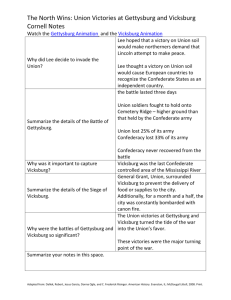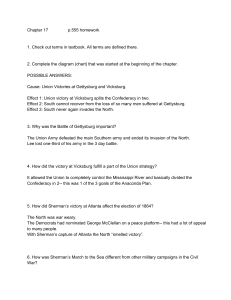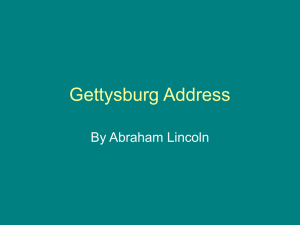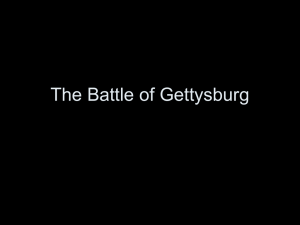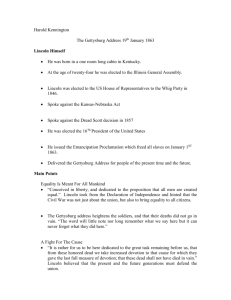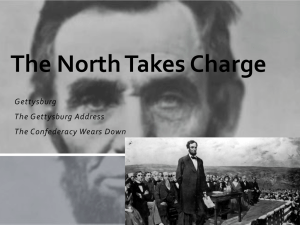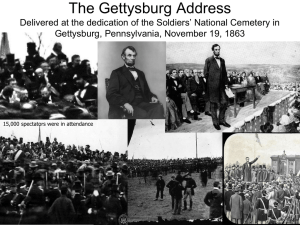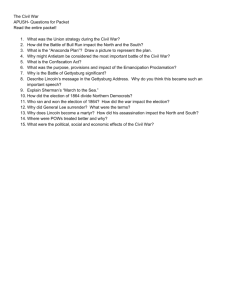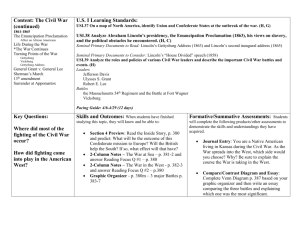Union Preserved, Freedom Secured
advertisement
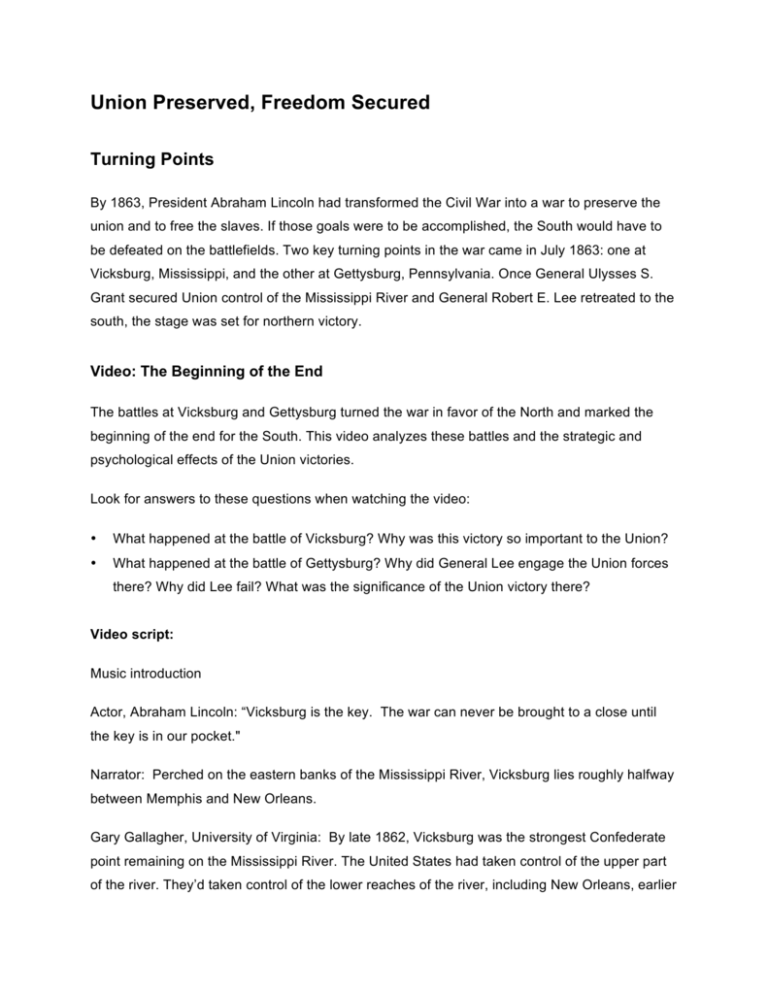
Union Preserved, Freedom Secured Turning Points By 1863, President Abraham Lincoln had transformed the Civil War into a war to preserve the union and to free the slaves. If those goals were to be accomplished, the South would have to be defeated on the battlefields. Two key turning points in the war came in July 1863: one at Vicksburg, Mississippi, and the other at Gettysburg, Pennsylvania. Once General Ulysses S. Grant secured Union control of the Mississippi River and General Robert E. Lee retreated to the south, the stage was set for northern victory. Video: The Beginning of the End The battles at Vicksburg and Gettysburg turned the war in favor of the North and marked the beginning of the end for the South. This video analyzes these battles and the strategic and psychological effects of the Union victories. Look for answers to these questions when watching the video: • What happened at the battle of Vicksburg? Why was this victory so important to the Union? • What happened at the battle of Gettysburg? Why did General Lee engage the Union forces there? Why did Lee fail? What was the significance of the Union victory there? Video script: Music introduction Actor, Abraham Lincoln: “Vicksburg is the key. The war can never be brought to a close until the key is in our pocket." Narrator: Perched on the eastern banks of the Mississippi River, Vicksburg lies roughly halfway between Memphis and New Orleans. Gary Gallagher, University of Virginia: By late 1862, Vicksburg was the strongest Confederate point remaining on the Mississippi River. The United States had taken control of the upper part of the river. They’d taken control of the lower reaches of the river, including New Orleans, earlier in 1862. Lincoln and his government wanted control of the Mississippi River, to divide the Confederacy. Narrator: Half of the geographical area of the Confederacy lay in the Trans-Mississippi states of Texas, Arkansas, and Louisiana. These states provided the South with critical troops and supplies. Thus Vicksburg was an important Union military objective. But the heavily fortified bluffs along the river prevented Vicksburg from being taken from the West, and the area to the North of the city was impassable swampland. Gary Gallagher: Grant was put in charge of this operation in late 1862 and he decided that he needed to get troops below Vicksburg, that is, south of Vicksburg and on the same side of the river as the Confederate defenders, that is, the east side of the river. Narrator: Grant opted for a daring move. The gunboats and several transports loaded with supplies would float past Vicksburg at night, hoping to avoid detection in the dark. Though the boats were spotted and hit repeatedly by rebel gunners, all but two made it safely downriver where they met Union troops and ferried them across. With his troops now in the heart of the Confederacy, cut off from lines of communication and supply, Grant headed east. Gary Gallagher: Grant then conducted a really fabulous campaign against Vicksburg, marching rapidly inland, eastward to the capitol of Jackson, winning battles along the way, then turning back to the west from Jackson and hemming in the Confederate defenders from that direction. James McPherson, University of Princeton: He cut the railroad between Jackson and Vicksburg and prevented any reinforcements from coming to Vicksburg from that side and he had control of all the routes of communication. His army could be reinforced and well supplied; whereas the Confederates were basically they were under siege and cut off from any supplies. Narrator: With Union shells raining down on Vicksburg, the citizens took to the cliffs along the river, burrowing into caves for protection. As the siege wore on through the late spring of 1863, they were reduced to eating mules and rats to survive. Meanwhile, in the East General Robert E. Lee decided on a bold and risky course of action. Gary Gallagher: Robert E. Lee had a number of reasons for invading Pennsylvania in June of 1863. Logistically he wanted to take the war out of Virginia, give the farms in Virginia a respite from the presence of armies for as long as possible. He wanted to gather food and fodder from Southern Pennsylvania and, if he could win a victory in the North, he thought that it would have a significant impact on Northern civilian morale. Narrator: The blue and the grey collided on the first of July, 1863. After a day of fighting in and around Gettysburg, Union troops had claimed the high ground to the south of the town. Lee wanted the heights taken. Gary Gallagher: The second day at Gettysburg is a series of very frustrating delays for Lee. It’s a time when George Gordon Meade is trying to get the army of the Potomac into a strong defensive position on that famous fishhook of high ground. Lee is trying to get his troops into a position to attack both ends of the Union line, both the Union right flank near Culp’s Hill and East Cemetery Hill and the Union left flank along Cemetery Ridge down in the direction of Little Round Top. I think Lee believed if he had gotten better coordination, if he had gotten an earlier start, if this had gone better, if that had gone better, he would have won a success, a tactical success, on the second day. As it was he had a series of very bloody and costly near misses that left the lines essentially where they had been the day before. Narrator: But Lee was determined to attack again on the third day, this time at the Union Center on Cemetery Ridge. His most trusted General, James Longstreet, fiercely disagreed. Actor, Gen. James Longstreet: “General Lee, I have been a soldier all my life and should know as well as anyone what soldiers can do. It is my opinion that no 15,000 men ever arrayed for battle can take that position.” Actor, Gen. Robert E. Lee: “The enemy is there and I am going to strike him.” Narrator: After an artillery barrage lasting two hours, Major General George Pickett’s division was to make the charge. Actor, Major Gen. George Pickett: “Up men, and to your posts! Don’t forget today that you are from old Virginia!” Narrator: As row upon row of rebel soldiers crossed the field and were cut down by Union fire, Union troops, remembering the slaughter of their own at Marye’s Heights six months earlier, began to chant “Fredericksburg! Fredericksburg!” Actor, Rebel Soldier at Gettysburg: Fredericksburg! Fredericksburg! “Seconds are centuries, minutes, ages. Men fire into each other’s faces not five feet apart. There are bayonet thrusts, saber strokes, pistol shots. Men going down on their hands and knees, spinning around like tops, throwing out their arms, gulping blood, falling - legless, armless, headless. There are ghastly heaps of dead men.” James McPherson: I think Meade fought a more skillful battle than he’s often given credit for, whereas Lee was suffering from what I sometimes call the Chancellorsville syndrome - that is, overconfidence. He had won against greater odds in the Battle of Chancellorsville just two months before Gettysburg. He thought the Union army was demoralized. He thought his own army was invincible. He said so. It turned out that he was wrong on both counts and his decision to attack repeatedly against well dug in defensive positions, against an army whose morale was not as badly impaired as Lee thought it was, was the principal reason why the Union forces won at Gettysburg. Gary Gallagher: He’s been second guessed about this endlessly, of course, by people who know the battle turned out to be a Confederate disaster and so said Lee shouldn’t have done what he did. Lee himself said not long after Gettysburg that if he’d known what he’d did was gonna fail, he would have done something else, but he didn’t know at the time it would fail so he continued the attacks. Narrator: Even by Civil War standards, the casualties at Gettysburg were appalling. In total, 51,000 men were lost on both sides, almost a third of all the troops engaged. This carnage made Gettysburg the bloodiest battle of the war. Badly beaten and filled with regret, Lee ordered a retreat. It was the fourth of July. On the same day, Lieutenant General John C. Pemberton surrendered the 31,000 Confederate soldiers at Vicksburg. Faced with starvation, his own troops had pleaded with him not to allow them to dishonor themselves by desertion. James McPherson: To surrender that many soldiers basically wiped out one whole Confederate army and more important, I think, opened up the whole Mississippi River to Union naval and civilian control and cut the Confederacy in two. Narrator: With the defeats at Vicksburg and Gettysburg, the Confederate high-water mark receded. James McPherson: You can look at the headlines in any Northern newspaper during the days after Gettysburg and get an idea just how important this victory was in boosting Northern morale. That battle, which had huge media coverage, probably had a more important impact on public opinion, especially in the North, than any other single battle in the war; and a more important impact on public opinion than even the capture of Vicksburg, which may have been strategically more important. In all of these ways: strategically, morale-wise, and control of territory, it was an important, and I think key, turning point in the war. End of video. Video: The Gettysburg Address The battlefield at Gettysburg was dedicated as a war memorial on November 19, 1863. This video analyzes Lincoln's Gettysburg Address, an eloquent speech that gave meaning to the appalling sacrifices of war and called upon the nation to pursue a new birth of freedom. Look for answers to these questions when watching the video: • Why is President Abraham Lincoln's Gettysburg Address significant? What ideas did he express? How did he give meaning to the war? • What lessons continue to be taught by battles fought during the Civil War? Video script: Music introduction Narrator: On November 19, 1863, the battlefield at Gettysburg was dedicated as a war memorial. The keynote speaker that day was Edward Everett, a famous Massachusetts orator. Everett spoke for two hours. When he sat down, President Lincoln rose to make the concluding remarks. Actor, Abraham Lincoln: “Fourscore and seven years ago, our fathers brought forth upon this continent a new nation, conceived in liberty, and dedicated to the proposition that all men are created equal. Now we are engaged in a great Civil War, testing whether that nation, or any nation so conceived and so dedicated can long endure. We are met on a great battlefield of that war. We have come to dedicate a portion of that field as a final resting place for those who here gave their lives that that nation might live.” James McPherson: The Gettysburg Address is 272 words long. It takes about two minutes to deliver, yet it embodied within those 272 words all of the ideas for which the North was fighting in the war and all the ideas that Lincoln, and I think most Americans, thought the United States stood for. And since Northerners thought they were fighting for the idea of a democratic government, for the ideals of the revolution, for the union of a nation created by the founding fathers, these are all the themes that Lincoln emphasized in the Gettysburg Address. And he also then went on to say that the North was now fighting for freedom as well as for Union. Actor, Abraham Lincoln: “The world will little note, nor long remember what we say here, but it can never forget what they did here. It is for us the living, rather, to be dedicated here to the unfinished work which they who fought here have thus far so nobly advanced… that this nation, under God, shall have a new birth of freedom…“ James McPherson: He started out the Gettysburg Address by reference to the Declaration of Independence, whether a nation based on the idea that all men are created equal can survive. Giving that nation a new birth of freedom added a new dimension, or Lincoln would have said, fulfilled the long unfulfilled ideas of freedom enunciated in the Declaration of Independence. Actor, Abraham Lincoln: …that government of the people, by the people, for the people, shall not perish from the Earth.” End of video. A Window to the Past Each year, thousands of men and women bring history alive by recreating Civil War battles such as Gettysburg and Vicksburg interviews with actors and spectators indicate these events contribute to people building a collective American memory. Cavalryman on Horse: "When you see a reenactment like this, you've got to picture this was real, you know, this really happened. It's almost like a window to the past. It's not 100% correct, but it gives people a rough image of what these men fought for and lost." Spectator 1: "So we came here to bring our children to give them a little bit of education and appreciation for the future that was fought for." Spectator 2: "And I want my children to know about the history of the country that they were born in. I want them to be able to look at people and when someone says that they participated in the armed forces, they realize the ultimate sacrifice that was given for them to be able to live in a country for the freedom that they have." Longstreet Reenactor: "My interest in the Civil War is to keep the history alive, which is something harder and harder to do these days. As we get older and time goes on, history has a way of fading. This is the best way I can think of to keep it alive and keep it current." Activity: Check Your Understanding Vicksburg, Mississippi was an important military objective for the Union because seizing it would allow the Union to divide the Confederacy. The grand strategy for Union victory was to divide and conquer the South. Seizing control of Vicksburg would assure Union control of the Mississippi River and separate Confederate states west of the river from those to the east. Union victory at Vicksburg was a major turning point in the Civil War. The South did not have to conquer the North to win the Civil War. Nevertheless, General Robert E. Lee believed an incursion into the North would ease pressure on Virginia, gain needed supplies, and shatter northern morale. Lee’s hopes were shattered by the loss at the ensuing Battle of Gettysburg. In the Gettysburg Address, President Abraham Lincoln framed the war as a test of American principles. Four months after the Battle of Gettysburg, President Lincoln went to the site to dedicate a portion of that field to those who died there. By connecting the war to the founding principles of liberty and equality, his eloquent address gave clear meaning to the Civil War. Furthermore, he challenged those supporting the Union to finish the task and give the nation a new birth of freedom.
